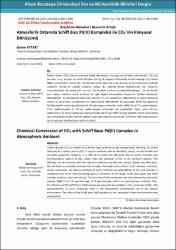Atmosferik ortamda Schiff bazı Pd(II) kompleksi ile CO2’nin kimyasal dönüşümü
Citation
Aytar, E. (2022). Atmosferik Ortamda Schiff Bazı Pd(II) Kompleksi ile CO2’nin Kimyasal Dönüşümü . Afyon Kocatepe Üniversitesi Fen Ve Mühendislik Bilimleri Dergisi , 22 (6) , 1290-1298 . DOI: 10.35414/akufemubid.1148214Abstract
Karbon dioksit (CO2) küresel ısınmaya sebep olan başlıca sera gazı olarak kabul edilmektedir. CO2 bol bulunan, ucuz, yanmaz ve toksik olmayan özelliği ile organik sentezlerde karbon kaynağı (C1) olarak dikkat çekmektedir. Ancak CO2 'nin kinetik olarak eylemsiz olma durumu ve termodinamik kararlılık sebebiyle verimli bir şekilde kullanımı zordur. Bu nedenle kimya endüstrisinde CO2 kullanımı sınırlanmaktadır. Bu zorluk etkili ve seçici bir katalizör yardımı ile giderilebilmektedir. CO2’nin formik asit, metan, metanol, amid, karbonat vb. gibi değerli kimyasallara başarılı bir şekilde dönüşümü bilinmektedir. Bu dönüşümler içerisinde özellikle CO2 ve epoksitlerin siklokatılma ile halkalı karbonat sentezi en umut verici olanlarından biri olarak kabul edilmektedir. Bu çalışmada, Schiff bazı ligand ve Pd(II) kompleks sentezi gerçekleştirildi. Bileşiğin yapısı elementel analiz, NMR (1H ve 13C) spektroskopisi, FT-IR spektroskopisi ve UV–vis spektroskopisi yöntemleri ile aydınlatıldı. Daha sonra CO2’nin epiklorhidrin ile halkalı karbonata dönüşümünde Schiff bazı Pd(II) bileşiği katalizör olarak kullanılarak hem atmosferik ortamda hemde reaktör ortamında etkinlikleri araştırıldı. Schiff bazı Pd(II) katalizörünün her iki ortamda da dönüşüme etkisi incelendi. Carbon dioxide (CO2) is considered to be the major greenhouse gas causing global warming. CO2 draws attention as a carbon source (C1) in organic synthesis with its abundant, cheap, non-flammable and non-toxic properties. However, it is difficult to utilize CO2 efficiently due to kinetic inertness and thermodynamic stability of CO2, which limits the utilization of CO2 in the chemical industry. This difficulty can be overcome with the help of an effective and efficient catalyst. Despite the difficulties, CO2 has been successfully converted into valuable chemicals such as formic acid, methane, methanol, amide, carbonates, etc. Mainly, synthesis of cyclic carbonate by cycloaddition of CO2 and epoxides is considered one of the most promising ways of utilization. In this study, Schiff base ligand and Pd(II) complex synthesis were carried out. The structure of the compound was characterized by elemental analysis, NMR (1H ve 13C) spectroscopy, FT-IR spectroscopy, and UV-vis spectroscopy, methods. Then, the efficiency of the Schiff base Pd(II) compound was used as a catalyst in the conversion of CO2 with epichlorohydrin to cyclic carbonate, both in the atmospheric environment and in the reactor environment. The effect of the Schiff base Pd(II) catalyst on the conversion in both environments was investigated.
Source
Fen ve Mühendislik Bilimleri DergisiVolume
22Issue
6URI
https://dergipark.org.tr/tr/pub/akufemubid/issue/73849/1148214https://hdl.handle.net/11630/11274
Collections
- Cilt 22 : Sayı 6 [25]



















